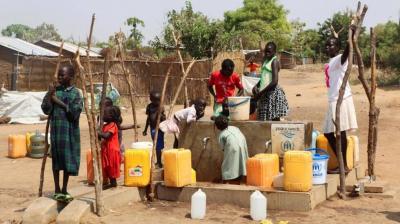Claire Nicollet, head of the Médecins Sans Frontières emergency team in Sudan, warned that the situation is catastrophic in Zamzam camp in the state of North Darfur, due to increasing security incidents in the city and its surroundings. She noted that 30% of the camp's population suffers from malnutrition and reported many cases of measles, expressing concern as the malaria season approaches.
Nicollet informed the Arab World News Agency (AWP) on Thursday about the difficult security situation in Al-Fasher, which is leading to a deterioration of humanitarian conditions, especially in Zamzam camp. She stated, "The situation in Al-Fasher is currently difficult due to security incidents, airstrikes, and increased pressure around the city and checkpoints. Unfortunately, the humanitarian situation is rapidly deteriorating. There are very few actors (from organizations) on the ground. Zamzam camp is experiencing severe malnutrition, and given the current situation, it is challenging to provide assistance."
The head of the Médecins Sans Frontières emergency team emphasized that food shortages are the most concerning factor for them, contributing to the malnutrition being witnessed in the area. Nicollet confirmed that 30% of Zamzam camp's population suffers from malnutrition, including children under five and pregnant or breastfeeding women, indicating that the situation is indeed catastrophic, as this figure exceeds emergency thresholds. She added, "The need for food in Zamzam camp is urgent—we are talking about nearly half a million people suffering from hunger, with no adequate food for a whole year."
Regarding other diseases prevalent in addition to malnutrition, Nicollet said, "We currently have suspected measles cases, and we know that measles is a very deadly disease that often accompanies malnutrition. The situation will be catastrophic, and soon it will be malaria season, so you can imagine the situation of malnourished children whose bodies are already weak. We may witness high mortality rates."
The head of the Médecins Sans Frontières emergency team in Sudan discussed the lack of hospitals and health centers, saying, "On top of that, we are receiving casualties due to the fighting. For example, in the past two weeks, we received 125 wounded from bombings and clashes." She added, "The city is large, and the health care situation is critical; there is only one functioning hospital in all of Al-Fasher, and the situation in Zamzam is also dire, with only two small health care centers, which are insufficient. Movement is difficult now due to the fighting and violence; the situation is catastrophic, and as long as fighting continues, the situation will be harder."
On the organization’s efforts in this regard, Nicollet stated, "Last week, we managed to secure a few beds for patients, but they are not enough given the population of 400,000 in the camp out of two million in Al-Fasher and many displaced people from all over Darfur." She mentioned that the organization needs to secure a supply line of food, medicine, and medical materials coming from Chad and to facilitate their entry. However, she complained about the lack of organizations that can play a role on the ground, saying, "We are completely alone. In Al-Fasher before the war, there were nearly 20 NGOs, and all UN agencies were present here, but now there are about three organizations responding to the massive needs of more than a million affected people just in Al-Fasher and Zamzam."
The Médecins Sans Frontières representative confirmed that they are in ongoing communication and discussions with UN agencies and NGOs at all levels "to explain the deteriorating situation," adding, "We are prepared to discuss providing them with a file to find ways to respond to this situation if they cannot be present on the ground, at least to send some supplies and foodstuffs to respond to this situation and improve anything at this stage."
Al-Fasher is the capital of North Darfur state. It is the only city in Darfur still under the control of the Sudanese Armed Forces, with a population of approximately 1.5 million, according to the United Nations. This includes about 800,000 displaced individuals who fled to the city from all over the five Darfur states during the previous Darfur war between 2003-2005 and the recent war since April 2023.




